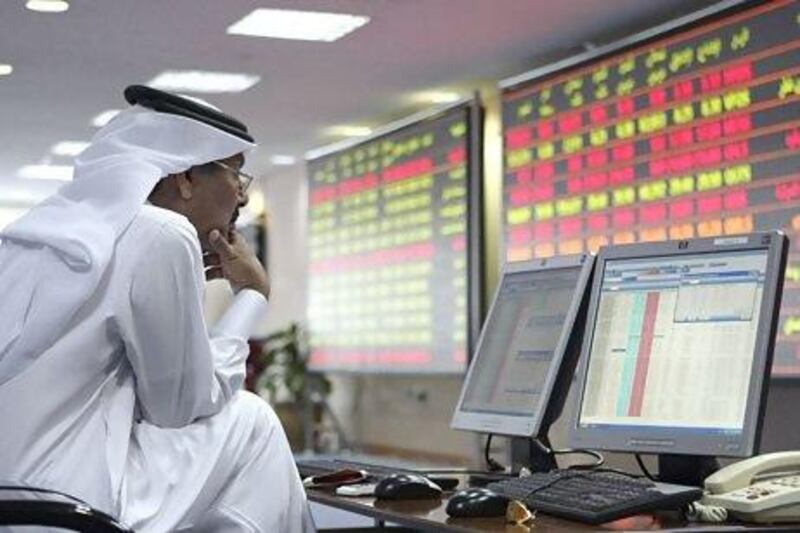Will it be sixth time lucky for the UAE and Qatar?
The annual review of the MSCI Emerging Markets index is due in June, and speculation is rife among investors about the future of the two countries' equity markets.
Tracking US$7.6 trillion of global equities, the MSCI Emerging Markets index is considered the A list of growth markets including heavyweights such as China and Brazil.
The UAE and Qatar failed to gain inclusion in 2009, in 2010, twice in 2011, and once more last year. As a result, most traders approach this year's event with the indifferent sigh of a jilted lover.
But a flow of new capital from institutional investors has introduced a greater degree of optimism into the mix as the clock ticks down to the next review.
The UAE - thwarted in efforts to gain index inclusion so many times because of wrinkles in its market infrastructure - has ironed out most if not all of the bugs, said Arindam Das, the regional head of HSBC Securities Services, the largest custodian bank.
"A lot of concerns that we had have gone down to a very large extent," he said.
The arrival of institutional investors was proof that exchange officials were pursuing the right strategy to improve their back-office functions, he added.
"Some of the infrastructural changes they've put in place - delivery-versus-payment, the failed trade mechanism - are certainly working in terms of encouraging longer-term investors."
The biggest problem of all previously cited was the need for institutional investors to hold two accounts, both with their brokerage and the custodian banks holding the shares. This split control of the shares between the two.
There were further problems if a brokerage did not correctly execute a trade. Previously, the seller of a share was compensated in the unlikely event of a failed trade, which could lead to its shares being sold against its wishes.
The buyer was happy, because they got their shares. But the seller would rather have his shares back than cash compensation - making the UAE's markets less attractive to institutional buyers who expect a rigorous trading process. As of this month, that has all changed.
"Rather than compensate the seller, they'll compensate the buyer. This was the most fundamental problem that MSCI was grappling with," he said. "Now it has been solved."
However, with only two months left until MSCI's review is due, it is uncertain whether the system will be fully tested, Mr Das added.
"We were very keen that they would implement it in January or February," he said. "But better late than never."
The move towards buyer compensation echoes a similar tale two years ago when exchanges in the UAE and Qatar implemented the delivery versus payment system, also known as DvP.
One of MSCI's key criteria, the introduction of the system that ensures payment is delivered at the same time as a share is transferred came just two months before the review date.
On that occasion, MSCI granted the UAE and Qatar a further review, which took place six months later. Both were ultimately unsuccessful.
However, despite some optimism about the improvements to market infrastructure, both Franklin Templeton Middle East and Standard Life Investments cited the need for a dual account structure as a distinct problem for trading in the UAE.
Qatar, meanwhile, struggles to gain inclusion because of low foreign ownership limits that limit investment in some of its biggest companies.
There are other issues that could arise should the UAE and Qatar be successful.
An upgrade for the two to "emerging market" status might lead for troubles in the MSCI Frontier Market index, where they both currently reside.
Were both upgraded, the large and liquid market in neighbouring Kuwait would have a disproportionate weighting on the performance of the frontier market index.
Ultimately, the fact that exchange officials were still engaging with MSCI over how to meet the criteria was a good sign for investors, said Peter Gotke, the vice president and regional head of depositary receipts at BNY Mellon.
"The ADX [Abu Dhabi Securities Exchange] and by association the DFM [Dubai Financial Market] continue to refine the delivery-versus-payment model to meet the requirements for global investors," he said.
MSCI will also consider whether or not to downgrade Greece from the Developed Markets index, and mull the exclusion of Morocco from the Emerging Markets index, in both cases because of lack of liquidity on their bourses.
Speculation is also high that MSCI may begin reconsidering Egypt's status as an "emerging market" because of several delistings as a result of acquisitions including Oracom Construction and National Société Générale Bank,some of the most liquid stocks on the EGX30 Index.





